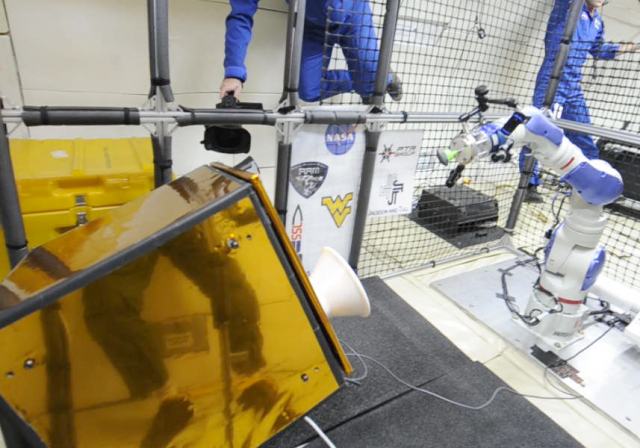The Robotics Demonstration and Test team, in the NASA Goddard Satellite Servicing Capabilities Office, used the Orocos ecosystem to control a Motoman SIA10D industrial robot to demonstrate autonomous visual tracking of both cooperative, and uncooperative, targets in microgravity.  NASA robot visually tracking a free-floating, non-cooperative target
NASA robot visually tracking a free-floating, non-cooperative target
Orocos
Using Orocos to visually track a free-floating target in micro-gravity
| Submitted by snrkiwi on Sun, 2011-09-18 19:33 |
- Login or register to post comments
- See complete post...
European Robotics Forum 2011 Workshop on the Orocos Toolchain
At the European Robotics Forum 2011 Intermodalics, Locomotec and K.U.Leuven are organizing a two-part seminar, appealing to both industry and research institutes, titled:
- Real-Time Robotics with state-of-the-art open source software: case studies (45min presentation, open to all)
- Exploring the Orocos Toolchain (2 hours hands-on, registration required)
The session will be on April 7, 9h00-10h30 + 11h00-12h30
- Login or register to post comments
- See complete post...
- Login or register to post comments
Roadmap ideas for 3.x
While the project is still in the (heavy?) turmoil of the 1.x-to-2.x transition, it might be useful to start thinking about the next version, 3.x. Below are a number of developments and policies that could eventually become 3.x; please, use the project's (user and developer) mailinglists to give your opinions, using a 3.x Roadmap message tag.
Disclaimer: there is nothing official yet about any of the below-mentioned suggestions; on the contrary, they are currently just the reflections of one single person, Herman Bruyninckx. Click below to read the rest of this post.
- Login or register to post comments
- See complete post...
- Login or register to post comments
Roadmap
Where things are going, and how we plan to get there.
See also Roadmap ideas 3x for some really long-term ideas ...
- Login or register to post comments
- See complete post...
- Login or register to post comments
Using XML substitution to manage complex deployments
Rationale
Problem: You deploy multiple configurations of your system, perhaps choosing between a real and simulated robot, some real and simulated device, etc. You want to parameterize the deployments to reduce the number of files you have to write for the varying configuration combinations
Solution: Use the XML ENTITY element.
Assumptions
- Works with Xerces only (v2 tested, v3 should also support this). Will not work with the default TinyXML processor.
Compatabilitry
Tested on v1.x trunk on Mac OS X Snow Leopard.- Login or register to post comments
- See complete post...
- Login or register to post comments
A. First day
Morning
Peter started to present the 2.x functionality, state and (from its point of view), shortcomings. The following are the points that have been risen during the discussion.
- TimeService: what is it for, and is not there other solutions ?
- right now, SlaveActivity is different from Slave execution engine. Click below to read the rest of this post.
- Login or register to post comments
- See complete post...
- Login or register to post comments
Real time logging
Recent ML posts indicate the desire for a real-time (RT) capable logging framework, to supplement/replace the existing non-RT RTT::Logger. See http://www.orocos.org/forum/rtt/rtt-dev/logging-replacement for details.
''NB Work in progress. Click below to read the rest of this post.
- Login or register to post comments
- See complete post...
- Login or register to post comments
Installing via Macports on Mac OS X
These are instructions to install the latest version of each of RTT, KDL, BFL and OCL, on Mac OS X using Macports.
Macports does not have official ports for these Orocos projects, however, the approach below is the recommended way to load unofficial ports in to Macports. [1]
Installation
For general installation instructions specific to each software version, see the top level wiki page for each project (eg. RTT, KDL, etc) and look for Installation in the left toolbar.
See below for specific additional instructions.
Installing from binaries / package managers
Installing via Macports on Mac OS X
Installing from source
To install from source on *NIX systems such as Linux and Mac OS X, see the installation page specific to your software version (e.g. Click below to read the rest of this post.
- Login or register to post comments
- See complete post...
- Login or register to post comments
Sample output
Sample output
The netcat shell, with the text the user typed in.
nc -l 50001 The quick brown fox jumps over the lazy dog. Click below to read the rest of this post.
- Login or register to post comments
- See complete post...
- Login or register to post comments
